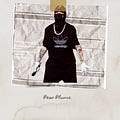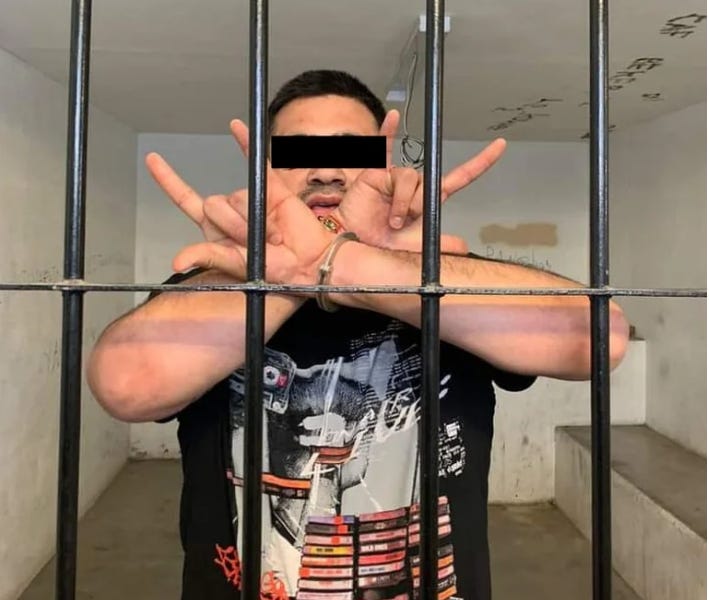This Is How Cartels And Corridos Singers Are Laundering Millions
A multi-million business that is flashy and at the same time shady enough to hide the source of its success.
*This is a story originally assigned by Rolling Stone in 2022 and after reporting, filing, undergoing three rounds of edits and several failed attempts to reach back to RS’ Senior Editor who assigned this story to either kill the story or publish, here it is. Enjoy the read!
Del Records is headquartered in a sprawling white building located on a busy Los Angeles intersection in Bell Gardens. From these offices, the music label, which has been around since 2009, has sent major Mexican artists such as Gerardo Ortiz, Eslabon Armado, Luis Coronel skyrocketing into fame, helping usher in an exciting new era of musica Mexicana.
But on May 20, 2020, Del Records was closed. The offices had shut down for the weekend, and they were dead silent – there were no executives planning out busy artist tours inside; there were no stars playing new music for their A&R managers. Outside, bystanders captured an unsettling scene: A small army of SWAT team members, dressed in helmets and tactical gear, surrounded the place with several armored official vehicles. A half dozen or so men gathered outside the glass doors of the building, setting up an explosive flash-bang device to force the offices open. After a loud boom, the fully geared crew went inside.
No arrests were made that day, and a search warrant officers had brought was kept under seal for months. But one year later, authorities arrived back at the office. This time, Del Records CEO José Ángel Del Villar, and his Financial Chief Officer Luca Scalisi were arrested for allegedly conducting businesses with a man accused of being a financial operator for the New Generation Jalisco Cartel (CJNG for its acronym in Spanish).
Del Villar and Scalisi were released days later on a $100,000 and $35,000 bond respectively. They’ve vehemently denied the accusations against them, releasing a statement calling their involvement in anything related to illegal narcotics “absurd.” “We believe the allegations stem from complaints of a disgruntled former business partner, and Mr. Del Villar and Mr. Scalisi look forward to clearing their names,” the statement continued. Both, however, are still pending conviction – and the case has exposed the increasingly tangled relationship between regional music, the cartels, and the FBI.
For decades, singers have written about the exploits of Mexico’s most notorious kingpins. Starting with narcocorrido icon Chalino Sánchez and his songs praising Raymundo Burgos ‘El Pelavacas’, a supposed druglord from Sinaloa who was betrayed by one of his own; to La Adictiva’s song of J.G.L. praising infamous kingpin Joaquín ‘El Chapo’ Guzmán’s empire and how he is missed in Culiacán, Sinaloa’s capital and cradle of the eponymous cartel; or the Luis Conríquez’ song for a man known as ‘double R’ or ‘RR’, a popular head of sicarios for the violent New Generation Jalisco Cartel (CJNG).
The first Mexican ballads about traffickers popped up during the alcohol prohibition era, with lyrics telling the exploits of the tequileros, tequila traffickers from Mexico to the U.S.
After prohibition ended in the U.S., it was the same genre who told the story of how Mexican traffickers moved from alcohol to poppy and weed, to keep their business afloat.
But throughout the history of the first narcocorridos and the illegal trafficking from Mexico to the U.S. the underlined subject in all of the songs have remained: the heroic figure of the narco, according to Elijah Wald, historian and author of ‘Narcocorrido, a journey into the music of drugs, guns and guerrillas’.
“The narcocorrido was made with the intention to celebrate a heroic figure in the drug trafficking industry, an underdog that came out of nothing and built an empire,” Wald told saga.
These days, the narcocorrido is having a moment like never before. From construction workers to executives to rap singers, everyone wants to sing how ‘El Chapo’ is still on top of the game.
“This could be the consequence of a global audience helped by streaming services. During the 90’s narcocorrido music had an impressive peak, but that time was boosted by the booming CD piracy industry, especially in Mexico,” Wald said.
Recent data made available by streaming platform Spotify could support Wald’s allegations. According to Spotify, corridos have seen an over 90 percent increase over the last six years, totaling over 24 billion streams in 2021.
As Mexican regional music peaks up to the top of the charts generating millions for music labels, accusations of having links to Mexican drug cartels have spiked.
The danger is that this is exactly what criminal organizations like: a multi-million business that is flashy and at the same time shady enough to hide the source of its success.
A cartel operative based in Michoacán said that it is not of his knowledge that artists pledge to criminal organizations, but rather the labels and concert promoters “are in business with them.”
“The patrones (drug lords) hire the artists for private concerts and if the relationship goes well with the artist and the managers, they start making business: the patron funds a series of concerts in several cartel-controlled cities and gets his money back by the end of the tour,” the operative said.
The music industry, particularly the Mexican regional given its recent popularity in the U.S. is one of the few industries generating as much money as the drug industry and at the same time “has a lot of loose ends in terms of accountability,” Juan Carlos Ramírez-Pimienta, academic from the San Diego State University specialized in narcocorrido music, Juan Carlos Ramírez-Pimienta told saga.
“The music industry is absolutely the best to launder money since it has little to no control regarding money management, like beer, you can say you sold 50 thousand beers when you actually just sold 500, or the tickets from a concert,” Ramírez-Pimienta said.
“At the end everyone is happy, the artist, his manager, the patrón and the people,” he added. “This industry has money for everyone, much like the drug industry. It is a relationship made in heaven, like beer and cocaine,” the cartel operative said.
But to some, the link between musicians and the cartel goes far deeper than just lyrics. According to officials and sources inside drug trafficking organizations who spoke to saga, criminal organizations in Mexico have found the perfect industry to launder millions of dollars profit from drug trafficking to the U.S – and it’s happening behind the business of massive concerts and successful record labels. However, many labels, artists, and executives now claim they’ve become targets of an unfair campaign against their music.
“The US government wants to make an example out of all of us, even if we are not involved in any illegal activity or cartel,” Grupo Codiciado lead singer, Erick Aragón, told saga. “I’ve been threatened by cartels and flagged by the US government to the point where they have rejected my application for visa twice.”
Aragón has had his share of narcocorridos singing and writing to one too many prominent cartel members, including recently arrested Héctor Eduardo Infante, known as ‘Tolín Infante’ who is allegedly a regional boss for the Sinaloa Cartel in Baja California, according to U.S. court documents.
“The fact that some are being part of or taking money from drug traffickers is having a bad effect on the industry, as many of us, like myself, are censoring ourselves. I’m not writing anything about narcos anymore, first because of fear, but also because the platforms are blocking our monetization…we are going to end up broke if we keep writing about them,” Aragón said.




